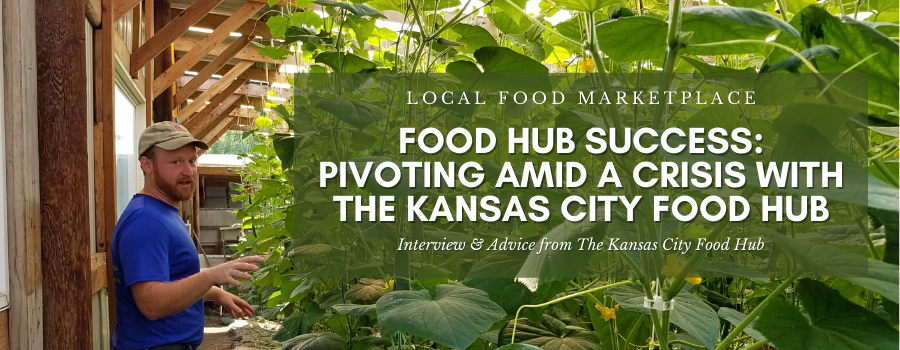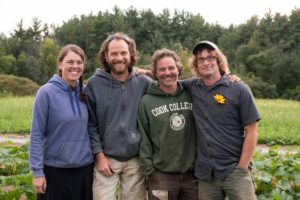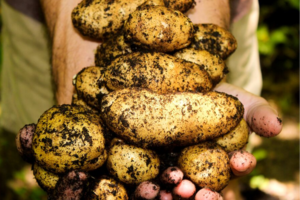Since 2009, Local Food Marketplace has supported hundreds of food hubs by providing a streamlined sales and distribution platform backed by our expert Support staff.
We’ve put together an informative blog series focusing on stories of successful food hubs we’ve worked with for years. In Part 1, we spoke with the Alaska Food Hub and learned the importance of resource sharing when starting a new food hub. In part 2, we interviewed the Kansas City Food Hub to find out key advice and lessons.
As new food hubs continue to emerge, we hope this series serves as a valuable resource to those starting out.
Part 2: The Kansas City Food Hub
In 2015, The Kansas City Food Hub was started as a farmer-owned and run cooperative after several feasibility studies confirmed food access needs in the area. As the primary market of wholesale accounts began to grow, the hub knew it needed a sales platform to manage orders. Originally serving corporate cafeterias, schools, hospitals, restaurants, and institutional buying, the organization wanted a multi-channel sales platform that seamlessly communicated with its producers. After some research, in 2018 the hub started using the LFM platform to manage and grow its wholesale accounts, while easily updating products and communicating with producers.
However, shortly after, the hub saw a major change in business. In March of 2020, “every single wholesale order was cancelled with the pandemic,” says Teresa Kelly, Food Hub Manager. Teresa quickly realized the food Hub needed to immediately shift to direct to consumer sales if they wanted to make it through the pandemic. Soon thereafter, they began offering CSA style boxes as well as home delivery to retail customers throughout the area.
Some key tools of the LFM platform that helped them successfully shift its business were the subscription and routing modules. These features allowed the Kansas City Food Hub to not only save 5-10 hours per week, but made the Food Hub able to manage doubling its sales. “We were hesitant to do door-to-door delivery, but the fact that the Routific integration is available allowed us the opportunity to test if [home delivery] was going to work,” says Katie Nixon, President and Co-Founder of the Kansas City Food Hub.
We recently had the opportunity to speak with President and Co-Founder of the Kansas City Food Hub, Katie Nixon, to learn more about what makes the food hub successful.
Key Challenges to Starting the Food Hub
-
- Financing
- The Kansas City Food Hub leaned heavily on a sub-hub structure to begin. Due to the high costs of starting a food hub, the cooperative decided to rent spaces as it grew. This meant they rented space from other farmers in the cooperative to fulfill the main operations of the food hub. In 2021, the organization has now expanded into renting aggregation space.
- Financing
-
- Cost of Logistics
- As the hub’s sales began to grow rapidly, so did expenses. When shifting from a wholesale to a retail/CSA structure, the cost of logistics grew exponentially. From increased labor needs to boxing to delivery, a key challenge was affording the start-up and growth costs needed to run the food hub.
- Cost of Logistics
-
- Cooperative Food Hub Model
- Another key challenge was the producer-run and -owned, cooperative model. “People don’t always fully understand cooperatives,” states Katie, “When you join, you are joining this business as a buy-in.”
- Cooperative Food Hub Model
Learning from Failure
All businesses experience failure, especially when just starting out. Katie shared with us a major failure that proved to be a strong lesson.
A previous director for the Kansas City Food Hub felt it would be a good idea to work with major food distributor US Foods, negotiating big sales of watermelon and sweet corn from a Kansas City Food Hub producer to the distributor. Unfortunately, none of the product ever got sold, leaving the farmer upset and with lots of unsold product.
Advice for a New Food Hub
-
- Use research and feasibility studies to give yourself more legitimacy and insight. Do not be afraid to hire outside consulting and connect with organizations to gain a base knowledge of your area. Katie says, “The advice we got from partners and consultants in the beginning are still in effect now.”The Kansas City Food Hub used the findings of the 2019 National Food Hub Survey by the Wallace Center to build the foundation of the hub’s business. By focusing on what caused other food hubs to fail, the Kansas City Food Hub was able to build a successful model from the start. Key takeaways from the report:
-
-
- Hire experts at the beginning
- Have your accounting system in place from the start
- Build a strong foundation for your food hub immediately, so that when chaos hits, you are better prepared to weather the storm.
-
-
- Create a base of reliable, anchor growers to provide consistent product, “and make sure you have the volume,” advises Katie.
-
- Focus on a value chain and community relationships. “If we didn’t have the partnerships we had, we wouldn’t be successful,” says Katie. “Because we are small, nimble, and local, our supply chain is really tight. We work more as a value chain rather than a supply chain, and we focus a lot on our partnerships.”
Learn more about LFM and how we support food hubs.
Get your Demo!
Learn more about LFM and how we support food hubs.
Get your Demo!Software Solutions with LFM
According to Teresa Kelly, Food Hub Manager, “[LFM] is worth every penny, and I’m surprised at how easy it was!”
The customizable LFM platform was essential for the success of the hub. “Having LFM and specifically the Subscriptions Module was the way we were able to manage the rapid change,” says Katie. “We almost doubled our sales, because we were buying and selling retail instead of just moving it through wholesale. LFM made this big shift possible!”
While sales grew, so did the hub’s expenses like boxing and materials, delivery, increased labor, and more. Wanting to save time and money, the Food Hub knew the needed to migrate away from its spreadsheets and Google Maps logistics methods. Instead, they opted to maximize LFM modules like the Routific Integration and Subscriptions Management. Using the Route and Distribution Management features with the Routific Integration “saved [us] 5-10 hours each week because [we] didn’t have to manually take a spreadsheet and build routes. The integration is so easy!” says Katie.
Another important aspect to the LFM platform that the Kansas City Food Hub loves is the flexibility of LFM to meet the needs of the food hub. The organization has complete control over its ordering period and windows when producers can update their product inventory. From holding inventory of shelf stable items to offering fresh products, the Kansas City Food Hub relies on the seamless integration of the LFM platform.
Want to learn more about how to be a successful food hub?
Check out our blog posts below:
Learn more about LFM and how we support food hubs.
Schedule your Demo today!




